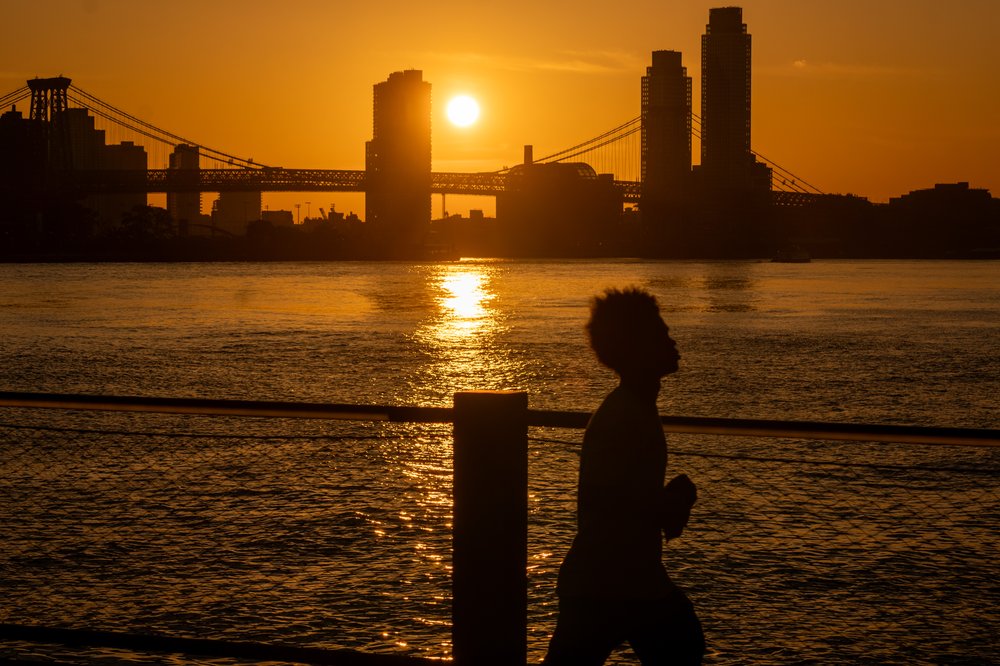Heat-related ER visits spike at NYC hospitals, but even they are no sanctuary
June 25, 2025, 5 p.m.
New Yorkers struggled to stay cool amid 96-degree temperatures.

As temperatures soar in New York City, emergency rooms are getting an influx of patients with symptoms of heat-related illnesses, including heat exhaustion, muscle cramps, fainting and heat stroke, according to city data.
And not all hospitals are providing the relief patients might expect. Brookdale Hospital Medical Center patients and staff were suffering earlier in the week after the Central Brooklyn hospital’s air conditioning system failed, PIX11 reported.
As of Wednesday afternoon, the hospital had implemented a system of “fans, portable air conditioning units and enhanced monitoring” to keep the facility cool, according to Amanda Barrett, a spokesperson for One Brooklyn Health, which runs Brookdale.
“We have been working diligently to maintain full functionality of our hospital cooling systems,” Barrett added.
Thunderstorms are expected to cool the city off in the coming days. While New Yorkers struggled under 96-degree temperatures through much of Wednesday, the humidity made it feel 10 degrees hotter, forecasters said.
On Tuesday, when the temperature in Central Park reached 99 degrees and the real feel was even higher, 112 patients went to emergency rooms across the city for heat-related conditions, a city tracker shows. That was up from 70 such emergency room visits on Monday when the high was in the mid-90s. Just 18 heat-related emergency room visits were reported Sunday, when temperatures peaked in the high 80s.
These figures don’t include patients who showed up with other health conditions that may have been exacerbated by the heat.
“ Fortunately, most of what we're seeing is people who are coming in with more mild illness,” said Dr. Nicole Gerber, a pediatric emergency medicine physician at NewYork-Presbyterian and Weill Cornell Medicine. “So people who are out in the heat and they're coming in because they pass out or are just not feeling well.”
In the nation's capital, under the same heat dome roiling New York City, U.S. Senate Minority Leader Chuck Schumer was briefly hospitalized Wednesday to be treated for dehydration, according to his office.
Gerber said it’s more rare to see patients experiencing heat stroke, a condition in which the body overheats and can’t cool down, which she referred to as “a true emergency.” It can be hard to tell without a thermometer if someone has heat stroke, but Gerber said someone experiencing it could be collapsed on the ground, acting irrationally or very disoriented and confused.
More mild heat-related illnesses can often be treated by going into an air conditioned space, relaxing and hydrating, Gerber said. But she added that if someone is unsure about whether to call 911 or go to the hospital, it’s OK to err on the side of caution.
“If you're worried and you're unsure, we're always happy to see you in the emergency department,” Gerber said.
During the heatwave, NYC Emergency Management has been monitoring both emergency room visits and hospitals’ facility needs, said agency spokesperson Aries Dela Cruz.
Dela Cruz did not specifically comment on the situation at Brookdale, but said the agency works with Con Edison to address any power outages. “Hospitals identified with critical energy needs are prioritized for restoration and backup power resources,” he said.
Hospitals that face a strain on their systems may receive generators or other help from the city, he added.
The state Department of Health is also “in communication with facilities experiencing cooling issues in order to understand the scope of any issues and to ensure appropriate steps are taken to protect patient and staff safety,” Marissa Crary, an agency spokesperson, said Wednesday afternoon. She added no facilities have requested assistance from the state.
This story was updated with additional information.
Your NYC guide to staying safe, cool and alive during the summer's first heat wave Sen. Chuck Schumer hospitalized for dehydration